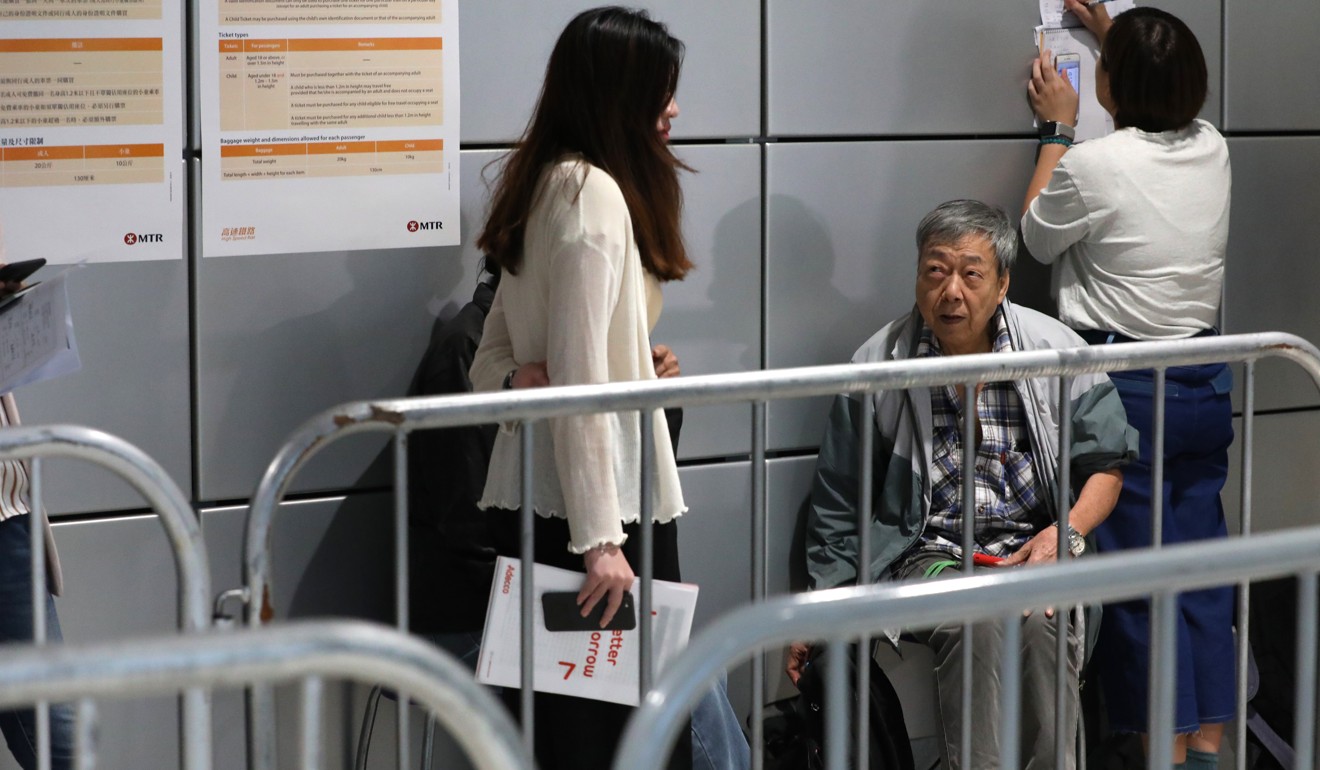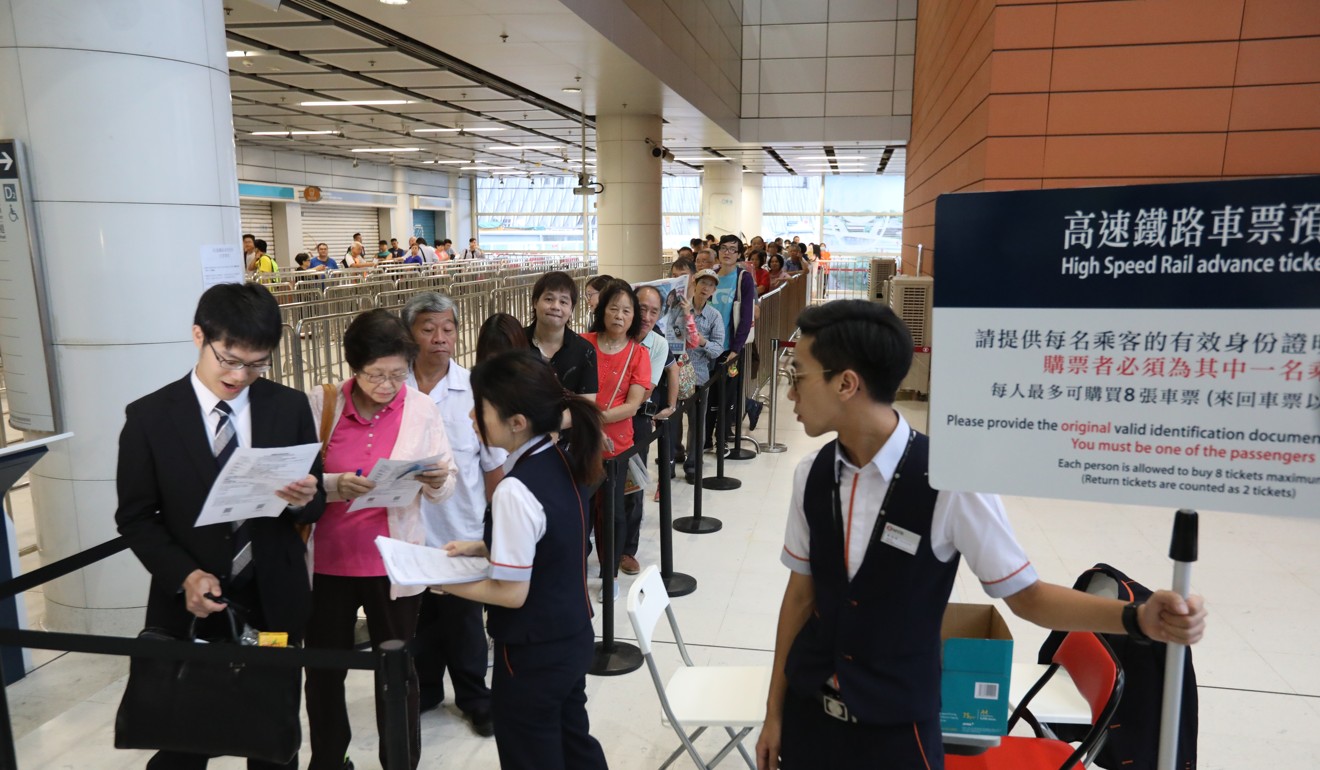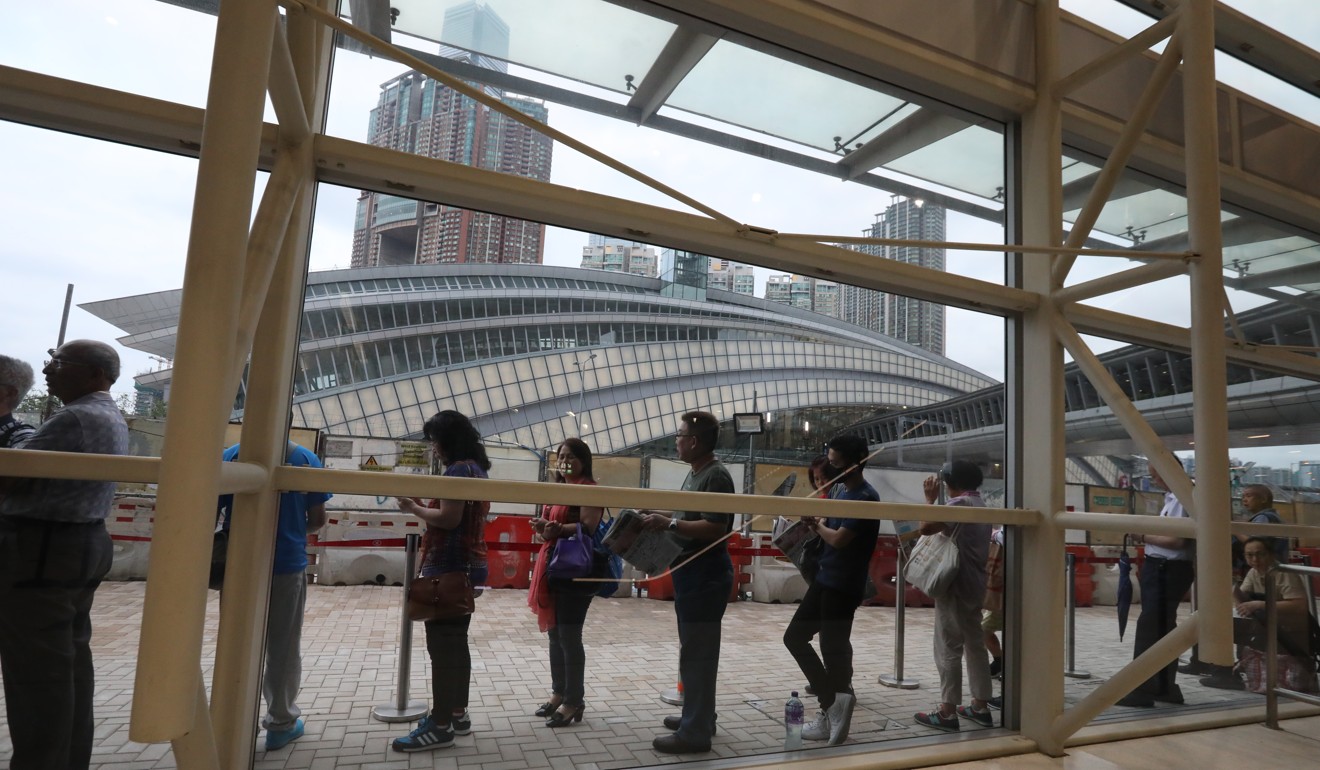
Ticket sales for Hong Kong’s high-speed railway off to bumpy start on first day of sale amid glitches in payment systems
Some had waited since Saturday morning for seats on trains to and from 30 mainland cities on the Guangzhou-Shenzhen-Hong Kong Express Rail Link
The first buyers booked more than 6,450 tickets in advance for Hong Kong’s new high-speed rail service to mainland China on Monday, amid glitches which the operator played down as “teething problems”.
While the MTR Corporation did not evaluate how successful the opening sales had been on the Hong Kong side, critics said it was far below expectations for a much-vaunted cross-border service estimated to carry at least 80,000 passengers a day. But more tickets are expected to be sold over the next couple of weeks before trains start running on September 23.
More than 3,500 tickets were snapped up at the West Kowloon terminus by nearly 1,800 buyers, while the rest were purchased online and over the phone, the MTR Corp said.

More than 300 people were eagerly waiting in line when the new station opened at 8am, many of them having waited two days in advance, corralled by the rail operator into Austin MTR station, which is linked to the terminus by a footbridge.
The long-delayed and overbudget Guangzhou-Shenzhen-Hong Kong Express Rail Link will connect Hong Kong with 30 mainland Chinese cities. The 26km Hong Kong section was built at a cost of $84.4 billion (US$10.8 billion).
Tickets for the first train to Shenzhen North station at 7am were sold out by noon on Monday. By 5pm, some 60 per cent of tickets for the first train on September 23 to Hongqiao station in Shanghai had been sold.

Each person was allowed to buy eight tickets after presenting proper identity and travel documents issued by mainland authorities.
“My family says I am a fool [to queue for such a long time]," Leung said. “But I think it's worthwhile, because I won't be able to buy tickets for the first train otherwise.”
MTR Corp operations director Adi Lau said ticket sales had gone smoothly, despite some “teething troubles”.
He cited, as an example, an apparent bug in the online ticketing system that prevented a traveller from buying a ticket originating from a station between Kunming and West Kowloon to the latter station, but it could process a transaction for a direct trip between the two stations.
“They would need to come to West Kowloon to buy the ticket … we are actively following this up,” Lau said.
But others who tried the system earlier in the day disagreed with Lau, with salesman TonnyChan describing it as “not totally ready for service”.
He said it took him about four hours – from 6.40am to 10.45am – to get a one-way ticket on the first high-speed train from West Kowloon to Shenzhen North on September 23.

“When it was my turn, I was told that they could not take my credit card via PayPass, or mobile payment with Apple Pay,” he said.
Were sacrifices Hong Kong made for high-speed rail link worth it?
A couple left the terminus angrily at about 11.15am, six hours after they arrived at Austin station. They were No 121 in the queue, and it took them four attempts to get the correct tickets.
“The first time, they got a name wrong. The second time, they got the dates wrong. The third time, they mismatched the names,” the husband complained.
A reporter from the Post was No 8 in line and took 40 minutes at one of the 28 manned counters to buy five one-way tickets – two to Shenzhen North and three to Guangzhou South – on the first trains on September 23.
Staff said tickets for different classes had to be bought separately, even for the same train. Transactions by PayPass failed once and UnionPay was rejected, although payments made via debit card, Alipay and WeChat Pay were successful.
Throughout the ticketing process, employees continually apologised for being unfamiliar with the system and for the payment failures.
Automatic ticketing machines were located at another end of the departure hall, but only transactions of up to HK$1,000 could be made, meaning most long-haul tickets could not be bought.
Media interest in rail link will wane once it’s proved a success
Lau explained this was because HK$1,000 was the upper limit for credit card payments that did not require the owner’s signature.
Although the MTR Corp said last Friday that only advance tickets from September 23 to October 2 would be available, tickets to and from several mainland cities, including Beijing, between October 3 and 10 could be picked up from the machines.
Asked if there had been an error in the announcement, Lau said the system could display tickets for 30 days starting from Monday, but the company wanted to avoid attracting too many passengers eyeing tickets for the October 1, the National Day holiday, on the first day of sales.
Opposition lawmaker Gary Fan Kwok-wai, who sits on the Legislative Council’s railways subcommittee, said the ticket sales on the first day were “far below ideal and the government’s own expectation”.
“Many of the tickets sold today were bought by reporters and people who were just curious,” Fan said. “So I am not optimistic about the future sales.”
He suggested Hongkongers were pragmatic enough to eventually turn to flights instead of the high-speed rail for “a rational choice after taking efficiency and costs into account”.
Yiu Si-wing, a subcommittee member representing the tourism sector was also unimpressed by the sales volume.
“But today’s number cannot fully reflect the popularity of the rail link because the online ticketing procedures are still too complicated and there haven’t been arrangements for making group reservations online,” Yiu said.
Pose threat to China and mainland ID card will be revoked
The express rail link is expected to connect the city to a total of 44 destinations on the mainland, across 30 cities, and is intended to be a key piece of cross-border infrastructure providing a boost to the city's economy and its status as a logistics hub.

